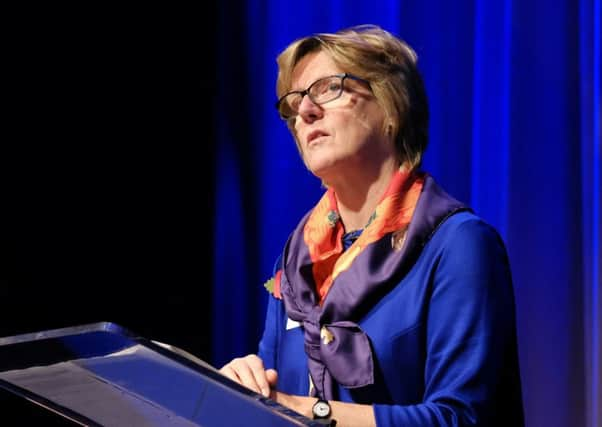World faces '˜post-antibiotic apocalypse', warns health expert


Dame Sally Davies, chief medical officer for England, has outlined the stark consequences of allowing antibiotics to lose their effectiveness, claiming it will spell “the end of modern medicine”.
Without the drugs used to fight infections, common medical interventions such as caesarean sections, cancer treatments and hip replacements would become incredibly “risky” and transplant medicine would be a “thing of the past”, she said. “We are facing, if we don’t take action now, a dreadful post-antibiotic apocalypse,” she said.
Advertisement
Hide AdAdvertisement
Hide AdHealth experts have previously warned that resistance to antimicrobial drugs could cause a bigger threat to mankind than cancer.
Dame Sally said the latest estimates were that about one in three or one in four prescriptions in primary care are probably not needed.
Antibiotics are used to prevent and treat bacterial infections. But antibiotic resistance takes place when the bacteria change in response to the use of these medicines.
Bacteria, not patients, become antibiotic-resistant.
Dr Andrew Buist, deputy chair of the British Medical Association’s Scottish GP committee, said: “GPs are often placed under huge pressure from patients to prescribe antibiotics even when the GP considers it’s not necessary. The public should be made aware that antibiotics are not a cure-all.”
In March Professor Alistair Leonard, the Scottish Government’s infection adviser, warned Scotland’s antibiotic use was three times the level recommended by experts to ward off a superbug crisis that could threaten modern medical procedures.
Prof Leonard also said Scottish hospitals had the highest antibiotic use in the UK.
Anas Sarwar MSP, Scottish Labour health spokesman, said: “This is a grave warning from England’s chief medical officer, and although the intervention is not directly aimed here, it is a warning we must heed.
“Scotland has the highest use of antibiotics anywhere in the UK, the number of prescriptions almost three times the level experts recommend. The Nationalists should explain how their decade in power has led to Scotland with the highest antibiotic use in the UK.”
Advertisement
Hide AdAdvertisement
Hide AdAround 700,000 people around the world die annually due to drug-resistant infections including tuberculosis (TB), HIV and malaria. If no action is taken, it has been estimated that drug-resistant infections will kill ten million people a year by 2050.
Dame Sally said that because antimicrobial resistance (AMR) is “hidden”, people “just let it pass”.
“This AMR is with us now, killing people,” she said. “It does not really have a ‘face’ because most people who die of drug resistant infections, their families just think they died of an uncontrolled infection. It will only get worse unless we take strong action.”
The comments come as the UK government and the Wellcome Trust, along with others, have organised a “call to action” meeting in Berlin for health officials worldwide.
Westminster will also use the gathering to announce a new project which will map the spread of death and disease caused by drug-resistant “superbugs”.
Westminster has also pledged to highlight the threat at home with a domestic awareness campaign alerting the public to AMR, reducing expectations they will be treated with antibiotics and supporting change among healthcare professionals.
Professor David Galloway, President of the Royal College of Physicians and Surgeons of Glasgow, said: “I welcome the announcement of this important partnership, and the chief medical officer’s clear warning call for action on this issue. Doing nothing is not an option. Whether it’s actively campaigning and educating patients and clinicians about the tendency to overuse antibiotic agents or clamping down on antibiotics being sold over the counter or via so-called online pharmacies, there is an urgent need for coordinated action now, and all medical professionals must play our part.”
A Scottish Government spokesman said: “We understand the spread of multi-drug resistant bacteria means that we could be close to reaching a point where we may not be able to prevent or treat everyday infections or diseases. That’s why, since 2007, we have achieved significant reductions in Healthcare Associated Infections due to better prescribing of antibiotics in hospitals and communities.
Advertisement
Hide AdAdvertisement
Hide Ad“We have provided £4.2 million to set up a Scottish Healthcare Associated Infection Prevention Institute, the largest ever single investment into research in Scotland. We have also commissioned key partners, including Health Protection Scotland, to come up with better ways of working to improve resistance to antibiotics now and in the future.”